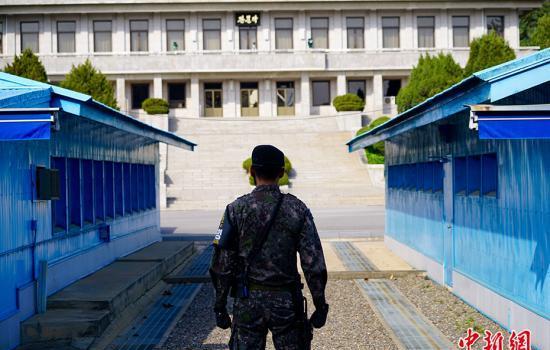China News Service Panmunjom, April 27 Title: Visit to the Common Security Zone Panmunjom Plays "Sound of Peace"
China News Service reporter Zeng Nai
On the 27th, the piano sound and singing in Panmunjom were loud, and artists from China, South Korea, the United States and other countries played the "Sound of Peace".

Infographic: Freedom House on the Korean side of Panmunjom, you can see the Banmen Pavilion on the opposite side of the North. China News Service reporter Wu Xu photographed
On April 27, 2018, South Korean President Moon Jae-in and North Korean Supreme Leader Kim Jong Un held their first meeting at Panmunjom and signed the Panmunjom Declaration. A year later, a reporter from China News Service followed the "joint interview group" to revisit the Panmunjom Common Security District (JSA).
After the armistice of the Korean War, the North and the South, based on the military demarcation line, retreated south and north to form demilitarized zones, and in 1954 established a common garrison zone.
Across the dividing line between Korea and North Korea, there is a row of "blue houses". The reporter saw on the side close to the South Korean side that the South Korean soldiers on duty were uniformly wearing black sunglasses. "'Sunglasses' are both a confidential identity and a way to avoid conflict with North Korean personnel in terms of eye contact." South Korean military personnel introduced.
For many years, Panmunjom has been heavily guarded, and Korean soldiers have been armed with live ammunition "on each side", and sporadic military conflicts have broken out many times. But since the situation on the Korean Peninsula eased last year, changes have quietly taken place.
The reporter found at the scene that the number of ROK and DPRK armed personnel was significantly reduced, and the "Blue House" side of the DPRK was once empty. Without the tweeter "shouting", it seems quiet, close to the weeds, and even insects can be heard.
Military equipment has also changed dramatically. "I used to wear pistols and bullets every day." According to a South Korean military personnel accompanying reporters, weapons are no longer carried in the common security zone, and the dress has changed from special military uniforms to light ordinary military uniforms.
In October last year, the ROK and the United Nations Command withdrew their guns, ammunition and other weapons and equipment from the joint security zone; since then, the ROK and the DPRK have completed the dismantling of 10 separate posts. "Military tensions between the ROK and the DPRK have been greatly eased." South Korea's unification minister, Kim Hoon-tie, said he would continue to implement the Panmunjom Declaration with firm will. However, he also admitted that there is still a long way to go to achieve permanent peace on the Korean Peninsula.
This path to peace is not an easy one. Since the second DPRK-US summit in February this year, the process of denuclearization of the peninsula has reached an impasse. Inter-Korean economic cooperation has basically stopped, and there have been "accidents" such as the unilateral withdrawal of the ROK-DPRK Joint Office by the DPRK. In the past month, the ROK-US and DPRK-Russia summits have been held one after another, and the international community, including China, has universally appealed for the DPRK and the United States to resume dialogue at an early date and resolve the Peninsula issue through diplomatic means.
The "peace tree" that Moon jae-in and Kim Jong-un planted last year is lush and tall. On the side, Japanese players played the flute, and artists from China, the United States and other countries were rehearsing intensely. A few hours later, a grand concert will be played to mark the first anniversary of the signing of the Panmunjom Declaration.
"This time it's not just about bringing beautiful melodies." American cellist Lynn Harrell said he hopes to take this opportunity to convey a peaceful force with music.
Wang Jian, a famous Chinese cellist, also said that the hope for peace is a common voice, hoping to bring warmth to Panmunjom with music.
The concert will "end" with a special piece of music. According to Cho Hyun-min, who is in charge of planning affairs at the Blue House of the South Korean presidential palace, the song describes a babbling stream that rushes through a rocky shoal and finally successfully merges into the ocean. "This is the portrayal of the relationship between the two Koreas today, and it is also our hope." (End)